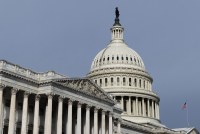Latest KFF Health News Stories
The FTC Escalates Biden’s Fight Against Drug Prices
It’s daggers out at the Federal Trade Commission in its fight against anticompetitive practices in health care. This past year, it has issued more stringent guidelines to block and discourage hospital mergers, and it investigated practices by middlemen in the drug supply chain. Now drug manufacturers themselves are in the agency’s crosshairs. In November, the FTC challenged the validity of more […]
New York Joins Local Governments in Erasing Billions in Medical Debt
New York City is the latest jurisdiction to buy and forgive a backlog of unpaid medical bills for its residents. Local governments across the country, including in the Chicago area, are doing the same to reduce debt burdens for lower-income residents.
With Trump Front of Mind, New Hampshire Voters Cite Abortion and Obamacare as Concerns
New Hampshire’s primary election was dominated by voters’ feelings about Donald Trump. But health care remains a concern — and for Democrats, preserving abortion access is a priority.
Federal Lawmakers Take First Steps Toward Oversight of $50 Billion in Opioid Settlements
The four-page bill lists how states should spend settlement money, but it doesn’t specify consequences for flouting the rules or name who is in charge of monitoring compliance.
Montana’s Effort to Expand Religious Exemptions to Vaccines Prompts Political Standoff
The dispute between state lawmakers and health department officials could delay a broader package of child care licensing changes until 2025.
Climate Change Raises Pressure on Biden To Keep Workers Cooler
With climate change posing rising threats to human health, the Biden administration is drafting federal rules to protect construction crews, warehouse workers, delivery drivers and the rest of America’s workforce from extreme heat. The regulatory effort has been years in the making, and its fate is far from certain. The Occupational Safety and Health Administration […]
Biden Cracks Down on Prior Authorization — But There Are Limits
More than a year after it was initially proposed, the Biden administration announced a final rule yesterday that will change how insurers in federal programs such as Medicare Advantage use prior authorization — a long-standing system that prevents many patients from accessing doctor-recommended care. “When a doctor says a patient needs a procedure, it is […]
Escuelas ignoran normas federales sobre restricción y aislamiento de estudiantes
La ley federal exige que los distritos escolares informen al Departamento de Educación de Estados Unidos cada vez que aíslan o restringen físicamente a un estudiante.
‘I’m Not Safe Here’: Schools Ignore Federal Rules on Restraint and Seclusion
Federal officials have long warned that restraint and seclusion in schools can be dangerous and traumatizing for children, but school districts often fail to report incidents as required by law.
What Would a Nikki Haley Presidency Look Like for Health Care?
Former South Carolina Gov. Nikki Haley’s tenure in the Palmetto State — which overlapped with several tumultuous years of health care reform — and her recent comments offer clues to how her presidency might affect national health care policy.
The AMA Wants a Medicare Cut Reversed – And Lawmakers To Stay Out of Care
Congress is back this week and feverishly working on a bipartisan agreement to fund the government for the rest of the 2024 fiscal year. Ahead of a potential vote, I spoke with Jesse Ehrenfeld, the president of the American Medical Association, the nation’s largest lobby group for doctors, about his organization’s priorities in Washington. Some […]
Hoping to Clear the Air in Casinos, Workers Seek to Ban Tobacco Smoke
Casinos in several states are fighting efforts to ban smoking, and trying to roll back existing anti-smoking laws. One planned facility even moved outside a city’s limits because of voter-approved smoking restrictions.
Delays in State Contracts Leave Montana Health Providers Strapped
The Montana Department of Public Health and Human Services is months behind in paying organizations contracted to connect people to care. The interruption is likely to have lasting effects, even after the state catches up.
California Offers a Lifeline for Medical Residents Who Can’t Find Abortion Training
Abortion restrictions in 18 states have curtailed access to training in skills that doctors say are critical for OB-GYN specialists and others. A new California law makes it easier for out-of-state doctors to get experience in reproductive medicine.
Rising Malpractice Premiums Price Small Clinics Out of Gender-Affirming Care for Minors
Even in states where laws protect minors’ access to gender-affirming care, malpractice insurance premiums are keeping small and independent clinics from treating patients.
Hay una nueva variante de covid-19 y aumentan los casos. Lo que necesitas saber
A nivel nacional, se ha registrado un marcado aumento en las visitas a salas de emergencia y hospitalizaciones por covid-19, influenza y el virus respiratorio sincitial.
There’s a New Covid-19 Variant and Cases Are Ticking Up. What Do You Need to Know?
The covid-19 virus is continually changing, and a recent subvariant, the JN.1, is rapidly climbing the charts.
RFK Jr.’s Campaign of Conspiracy Theories Is PolitiFact’s 2023 Lie of the Year
Debate and speculation are heating up over whether Robert F. Kennedy Jr.’s presidential campaign will factor into the outcome of the 2024 election. But one thing is clear: Kennedy’s political following is built on a movement that seeks to legitimize conspiracy theories.
What the Health? From KFF Health News: 2023 Is a Wrap
2023 was another busy year in health care. As the covid-19 pandemic waned, policymakers looked anew at long-standing obstacles to obtaining and paying for care in the nation’s health care system. Meanwhile, abortion has continued to be an issue in much of the nation, as states respond to the Supreme Court’s 2022 decision overturning the constitutional right to the procedure. This week, Rachel Cohrs of Stat, Sandhya Raman of CQ Roll Call, and Joanne Kenen of Johns Hopkins University and Politico Magazine join KFF Health News chief Washington correspondent Julie Rovner to discuss these issues and wrap up the year in health. Also this week, Rovner interviews KFF Health News’ Jordan Rau about his joint KFF Health News-New York Times series “Dying Broke.”
‘Financial Ruin Is Baked Into the System’: Readers on the Costs of Long-Term Care
Thousands of people shared their experiences and related to the financial drain on families portrayed in the “Dying Broke” series, a joint project by KFF Health News and The New York Times that examined the costs of long-term care.





















